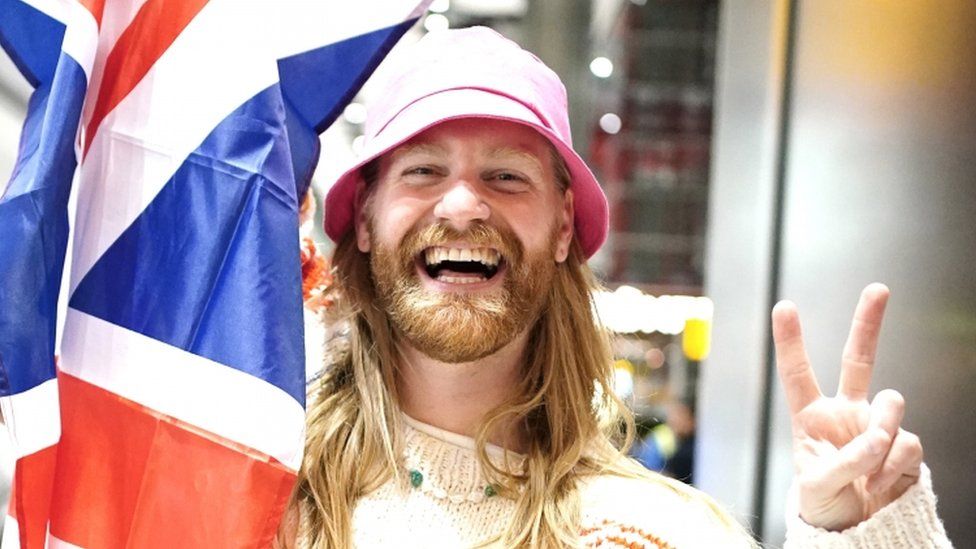UK to host next year's Eurovision Song Contest
- Published
- comments

The UK will host the Eurovision Song Contest next year after organisers decided it could not be held in winning country Ukraine due to the ongoing war.
Oleh Psiuk, the lead singer of 2022 winners Kalush Orchestra, expressed his gratitude to the UK for holding the event "in support of our country".
The UK, which has hosted Eurovision eight times, was chosen after Sam Ryder came second in this year's contest.
Several UK cities have already expressed interest in hosting.
The country which wins usually stages the following year's competition. But show organisers the European Broadcasting Union (EBU) opened talks with the BBC last month after assessing the situation following Russia's invasion.
Psiuk said he was "very sad" that Ukraine could not host the contest but he hoped it would "celebrate our beautiful, unique culture".
"We, in turn, will make all efforts to help Ukraine win next year as well, so that Eurovision 2024 can take place in a peaceful country", he added.
Officials have called for the singing competition to reflect and celebrate Ukrainian culture.
The UK has a number of cities with suitable arenas, accommodation and international transport links, with London, Sheffield and Manchester already confirming that they will put in an official bid.
Leeds, Liverpool, Newcastle, Birmingham, Aberdeen, Brighton, Bristol, Belfast, Cardiff and Nottingham could also throw their hats into the ring.
The EBU have said the host venue should accommodate about 10,000 spectators, be within easy reach of an international airport and have enough hotel accommodation for at least 2,000 delegates, journalists and spectators.
Ukraine's win was "deserved" and "encapsulated everything the song contest is about," said Spaceman singer Ryder.
"The main thing is that we throw an amazing event that celebrates Ukraine - and one thing's for sure, we know how to throw a party here in the UK."
The Essex singer told BBC Newsbeat he hoped the host city would be one that has believed in and supported the song contest.
The bidding process to decide which city will host will begin this week.
The BBC and the EBU will consider all official approaches and will publish the longlist later this summer.
Hosting Eurovision can be an expensive business. Azerbaijan reportedly spent £48 million on hosting the event in 2012.
A BBC spokesperson said the singing competition is a "a co-production of the host broadcaster and participating members of the EBU"."There are a number of funding options to be explored that will contribute towards delivering a fantastic event and great value for licence fee payers."
Tickets usually go on sale a few months before the contest, once the specific venue is chosen.
The date for the contest's Grand Final hasn't been announced yet but it usually happens in May.
Ukraine will automatically qualify for the Grand Final, as is usual for the winner, along with the so-called Big Five - which includes the UK, France, Germany, Italy and Spain. They each go straight through to the final because of their financial contributions to the event.
Ukraine's public broadcaster UA: PBC will work with the BBC to develop Ukrainian elements of the show.
Mykola Chernotytskyi, head of UA:PBC, said: "We are grateful to our BBC partners for showing solidarity with us."
Last month's announcement of talks with the BBC was met with disappointment by Ukrainian Culture Minister Oleksandr Tkachenko, who issued a statement "demanding to change the decision".
But on Monday, Chernotytskyi expressed gratitude to the BBC in a statement, saying: "I am confident that together we will be able to add Ukrainian spirit to this event."
The EBU acknowledged Ukraine's initial disappointment, but said the decision was made for the "safety and security of everyone working and participating in the event".
Reflecting Ukrainian creativity
Prime Minister Boris Johnson and Culture Secretary Nadine Dorries both welcomed the news, while acknowledging the unwanted circumstances.
Ms Dorries said she was "delighted", but sorry it was not possible to host the event in Ukraine, "where it should be".
She added that the UK would "ensure it reflects Ukraine's recent Eurovision victory and Ukrainian creativity".
Mr Johnson tweeted that the UK would put on a "fantastic contest on behalf of our Ukrainian friends".
BBC director general Tim Davie said it was a "great privilege" to host the music competition, but regretful that Ukraine was not able to host.
He said the broadcaster would make the event "a true reflection of Ukrainian culture alongside showcasing the diversity of British music and creativity".
Eurovision hosting facts
- The UK has hosted Eurovision eight times - more than any other country
- It has taken over hosting duties for other countries four times
- It hosted for the Netherlands in 1960, for France in 1963, for Monaco in 1972; and Luxembourg in 1974
- The UK last hosted in 1998, from Birmingham, after Katrina and the Waves' win
- Harrogate, Brighton, Edinburgh and London have also been host cities
- Israel was the last country that declined to host, in 1980, having also won the year before
Martin Österdahl, who oversees the Eurovision Song Contest, said: "We're exceptionally grateful that the BBC has accepted to stage the Eurovision Song Contest in the UK in 2023."
Ukraine's entrant Kalush Orchestra won this year's contest in May in a symbolic show of public support, while Sam Ryder came second for the UK, the country's best result since 1998.
Katrina Leskanich, whose UK entry won the 1997 contest with her group Katrina and The Waves, told BBC 5 Live it was "an absolute privilege" for the UK to host and that this would "obviously" be handled sensitively.
She added that Eurovision is a "growing phenomenon", which has also now reached the US, which has its own version of the contest. It was won in its first year by K-pop singer AleXa.
"People love it. It brings people together," Leskanich said.
- Published17 June 2022
- Published23 June 2022
- Published17 June 2022